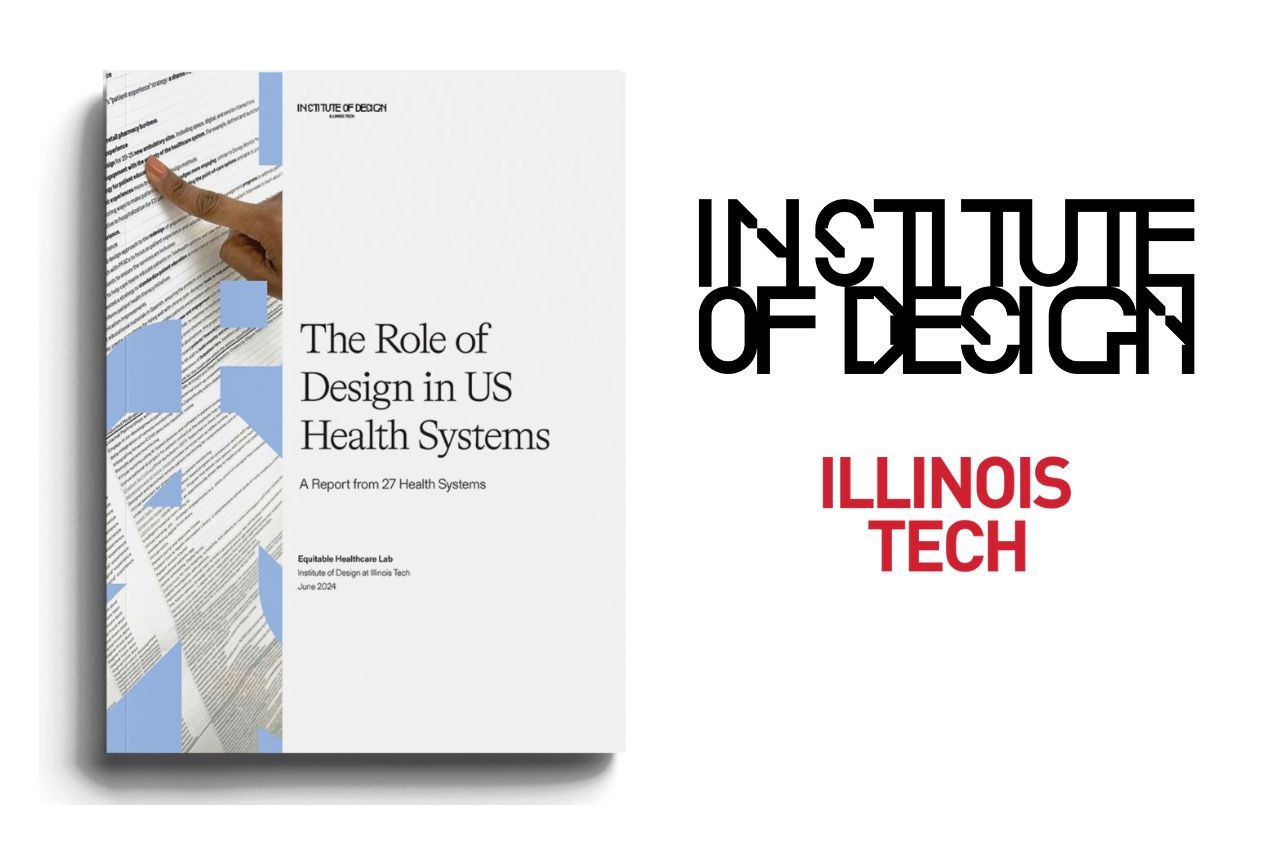Equitable Healthcare Lab at the Institute of Design Releases Landmark Report on the Role of Design in U.S. Health Systems
First-ever study of how professionally-trained designers are being integrated into the core missions of health systems

CHICAGO—August 16, 2024—Illinois Institute of Technology’s (Illinois Tech) Institute of Design (ID) Equitable Healthcare Lab has released “The Role of Design in US Health Systems,” the first comprehensive assessment of design’s role in healthcare.
2023 marked the 20th anniversary of design’s integration into US health systems, first pioneered by Kaiser Permanente in 2003 and Mayo Clinic in 2004. Over 40 health systems now employ design and designers, yet these efforts have largely been undocumented, making them difficult to learn from or build upon. To address this knowledge gap, the report highlights how 27 health systems have structured and measured their designers, defining nine diverse contributions and presenting impactful stories that illustrate the value of a design approach to common healthcare delivery challenges.
“Our report documents the valuable but under-examined role that designers play in healthcare,” said Kim Erwin, director at Equitable Healthcare Lab and primary author of the report. “By detailing the diverse contributions of designers and presenting real-world impact stories, this report provides new information to health system leaders about how designers can meaningfully transform care delivery and improve outcomes.”
The U.S. Department of Veterans Affairs (VA) is one of the Role of Design report’s 27 health systems who shared the contributions and impact of designers with the report authors. John W. Boerstler, Chief Veterans Experience Officer stated, “The collaboration with Illinois Tech has been useful in helping validate how we approach healthcare delivery at the VA through the lens of design and process improvement. By utilizing human-centered design and training more design thinkers, VA is pioneering a new era of veteran care that prioritizes the needs and experiences of those who have served our country.”
The Veterans Experience Office (VEO) at the VA, launched in 2017, has embraced human-centered design to drive improvement and coordination of veteran experiences and healthcare services. With a focus on real-time data collection and feedback, they have mapped over 150 projects, leading to significant improvements in trust and care coordination. The VA’s trust score, a key metric similar to a Net Promoter Score, has increased from 55% to nearly 80%, reflecting the positive impact of these design initiatives.
Design—a broad field that comprises diverse disciplines—is not well understood by health system leaders. To better define design’s value to health systems, the Equitable Healthcare Lab collected more than 260 projects from design practitioners to identify common contributions.
“This comprehensive first-of-its-kind report marks a significant milestone in understanding the breadth and depth of design’s impact on the healthcare industry,” says Anijo Mathew, Dean, Institute of Design. “The report is a powerful showcase of what ID’s Action Labs can do—partner with complex systems and industries, using design to take purposeful action and create the change people want.”
ID Action Labs are dedicated to addressing the world’s most pressing issues—including equitable healthcare and food systems. The Equitable Healthcare Lab works with health systems to design more inclusive medicine.
“This landmark report provides healthcare leaders with a roadmap for integrating design into their systems, highlighting its critical role in enhancing patient care and operational effectiveness,” said Dr. Saurabha Bhatnagar, Faculty Director, Global Executive Education Harvard Medical School, and member of the Role of Design Advisory Council and ID Board of Advisors. “This is the most comprehensive report on operational design in healthcare to date—it’s important that this report is open for anyone to download and read, to have the opportunity to learn what leading organizations are doing to design a better healthcare system.”
Dr. Bhatnagar, a leading physician executive and Illinois Tech alumnus, has played a significant role in driving healthcare industry transformations through his diverse leadership positions and expertise in human-centered design. As part of this report’s 10-member Advisory Council, he reviewed and prioritized findings and offered report insights at a summit at ID in Chicago earlier this year.
Key Findings from the Report:
- Profiles of 29 Teams from 27 Health Systems: Detailed accounts of how these teams are structured, their practice areas, and their success measures.
- Interviews with 48 Designers and Design Leaders: Insights from professionals across 27 health systems.
- 6 Impact Stories: Six real-world examples showcasing how design addresses healthcare challenges.
- 9 Contribution Areas: Nine distinct areas where designers make significant contributions, derived from an analysis of over 260 projects.
- Model for Organizational Transformation: A conceptual framework for leveraging design across within a health system to transform care.
One key finding of the report is that designers can have an impact from many different positions within a health system, but what may be most important to facilitate design impact is how close they are to leaders in the C-suite. A high-level organizational champion can position design, introduce it to leaders of other established departments and processes, and advocate for its inclusion.
The report also found that while designers have often been siloed in separate “innovation units,” there’s been a growing trend toward integrating designers into the core operations of a healthcare organization. By embedding designers with other exploratory disciplines throughout the health system, organizations can more fully take advantage of their design investments and promote the full impact of human-centered design.
Future Directions:
The report emphasizes the need for wider investment in design capabilities to address current healthcare challenges, including tightening profit margins, staff burnout, and an aging population. It calls for enhanced dialogue between designers and healthcare leaders to fully realize the benefits of human-centered design.
“Designers are effective change agents in every other industry. How can we accelerate their uptake and optimize their deployment in health systems, which badly need transformation to respond to their new technical, economic and market realities?” asked Erwin. “This report offers a common language and set of frameworks to help designers and health system leaders initiate talks about a new kind of partnership — one focused on the future and mission of healthcare and improving the health of the people they serve.”
Press Quotes
Ophelia Chiu, MHA, Vice President of Strategic Innovation at Memorial Sloan Kettering Cancer Center:
“Human-centered design has made significant inroads across various health systems, with vast potential to drive much-needed change and transformation in the industry. This report highlights specific impacts that designers are making in healthcare—especially when ‘design’ is more broadly defined and its full potential tapped to affect healthcare delivery, from service design to strategy.”
Sharon Markman, MHA, Executive Director of Clinical Excellence, Innovation & Engagement and Director of the Center for Healthcare Delivery Science and Innovation at University of Chicago Medicine:
“This report is a testament to the invaluable contributions of design in advancing healthcare delivery. Designers are uniquely positioned to bridge gaps between departments and drive meaningful change in the healthcare system, collaborating across silos and implementing strategic initiatives at the frontline of medicine. By integrating patient-centered design at every level of our health systems, we can create more effective strategies, make our operations more efficient, and improve outcomes for patients.”
Sean Molloy, MHSc, MDes, Director of the Centre for Quality and Design, People-Centered Care and Care Transitions at North York General Hospital:
“This comprehensive report illustrates how leading health systems are enhancing their services by using design as a key driver of user-centered innovation. It offers insights into how design helps health leaders tackle complex challenges in patient care, healthcare delivery, and system transformation. By charting a future course for leaders to integrate design into their organizations, the findings aim to deepen understanding of design’s role and its impact on achieving positive clinical outcomes and improved patient experiences in organizations that embrace it as a mindset and tool for change.”
Stephen Weber, MD, Executive Vice President and Chief Medical Officer of University of Chicago Medicine:
“The integration of human-centered design has already transformed the way we approach patient care, and its potential for the future of healthcare and medicine is boundless. This report underscores the profound impact design can have on improving patient outcomes and efficiency. By prioritizing the patient’s perspective, we can create more empathetic, effective, and resilient healthcare systems.”
About Illinois Institute of Technology
Based in the global metropolis of Chicago, Illinois Tech was born to liberate the power of collective difference to advance technology and innovation for all. It is the only tech-focused university in the city, and it stands at the crossroads of exploration and invention, advancing the future of Chicago and the world. It offers undergraduate and graduate degrees in engineering, computing, architecture, business, design, science and human sciences, and law. Illinois Tech students are guaranteed access to hands-on experiences, personalized mentorship, and job readiness through the university's one-of-a-kind Elevate program. Its graduates lead the state and much of the nation in economic prosperity. Its faculty and alumni built the Chicago skyline. And every day in the city's living lab, Illinois Tech fuels breakthroughs that change lives. Visit iit.edu.
About Institute of Design (ID)
The Institute of Design (ID) at Illinois Tech turns design into a powerful tool anyone can use to transform the systems that shape our lives—from cities, education, and finance to food, healthcare, and technology. Founded by László Moholy-Nagy as The New Bauhaus in 1937, today ID is home to the only US design school devoted completely to graduate students. But ID is more than a graduate school. By uniting science and rigor with creativity and rapid iteration, ID is recognized around the globe as pioneering human-centered design, systems design, and other methods that apply design to the real world. At ID, learners and leaders discover what design makes possible. Learn more about ID at id.iit.edu.
Media contacts
Petra Kelly
Communications Director
Illinois Institute of Technology
Cell: 773.771.1064
pkelly6@illinoistech.edu
Kevin Dollear
Communications Manager
Illinois Institute of Technology
Cell: 773.860.5712
kdollear@illinoistech.edu




